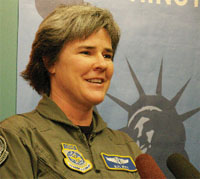Second big legal victory against DADT

Margaret Witt
For the second time this month, a federal judge has ruled Don’t Ask, Don’t Tell violates the federal constitution.
The latest ruling came from the U.S. District Court for Western Washington, in Tacoma, where Judge Ronald Leighton said Air Force Reserve nurse Margaret Witt’s sexual orientation did not negatively impact her unit’s morale or unit cohesion. He said Witt’s discharge under Don’t Ask, Don’t Tell (DADT) violated her Fifth Amendment right to due process.
On September 9, U.S. District Court Judge Virginia Phillips ruled, in Log Cabin Republicans v. U.S., that DADT violated both First and Fifth amendment rights of gay servicemembers.
The Witt v. U.S. case has been a high-profile one and the subject of debate on the floor of the Senate and in the confirmation hearing of the U.S. Supreme Court’s newest member, Elena Kagan.
Senate Republicans charged that Kagan, as Solicitor General, undermined the DADT law when she advised the Obama administration not to appeal to the Supreme Court a preliminary ruling in the Witt case. That preliminary ruling, from the 9th Circuit U.S. Court of Appeals, said Witt and other servicemembers discharged under DADT were entitled to trial proceedings to determine if their being gay was, in fact, a detriment to military morale and unit cohesion.
Judge Leighton presided over a trial this month to determine whether there was any evidence to the military’s claim that Witt’s relationship with a woman was detrimental to her military unit.
During the seven-day trial, Leighton heard testimony from Witt’s comrades that it was her discharge—and not her being gay—that inflicted injury to her Reserve unit’s morale.
Attorneys for the U.S. Department of Justice, defending the DADT law, put on witnesses to discuss Witt’s relationship with a married civilian woman and argued that Witt’s adulterous behavior was also to blame for her discharge. The government also noted that Witt had told at least two colleagues she was gay, thus putting them in an awkward position of either keeping silent to protect her or informing superior officers of Witt’s being in violation of the DADT law.
In his opinion Friday, September 24, Judge Leighton noted that the 9th Circuit had directed him to determine whether the application of DADT to Witt “significantly furthers the government’s interest, and whether less intrusive means would substantially achieve the government’s interest.” The 9th Circuit also directed him to use “heightened scrutiny” of the government’s reasons for DADT –a level of scrutiny that required the government to offer more than just a “rational” reason; it had to identify an important reason for Witt’s discharge.
While the government made the “unassailable point that uniformity and consistency in the administration of personnel policies is a desirable objective,” said Leighton, “When similar people are treated differently, morale and cohesion suffer.”
Leighton added that the evidence at trial “overwhelmingly supports” Witt’s claim, that her discharge did not advance the government’s interest in unit cohesion and morale. Instead, said Leighton, the discharge had the “opposite effect.”
“In support of the Congressional findings underpinning DADT, the government can point to polls and petitions which reflect Congress’ fear that openly serving gays and lesbians will negatively impact military readiness by eroding unit morale and cohesion across the services without regard to any one individual’s billet or job description,” wrote Leighton. “Again, these polls are some evidence that some folks would prefer to not serve with admitted homosexuals. That such views may lead to a drop in recruitment or retention is a possibility, just as it was a possibility during the integration of blacks, other minorities and women into the armed forces. The possibility of such push back is off-set by the known negative impact of DADT upon the military: the loss of highly skilled and trained military personnel once they have been outed and the concomitant assault on unit morale and cohesion caused by their extraction from the military. In this regard, the Court notes the Army’s policy of deploying openly gay or lesbian personnel if the discharge process has not yet begun when the order to deploy issues. In this time of war, the Army, at least, has decided that allowing openly gay service is preferable to going to war without a member of a particular unit.”
Witt joined the Air Force in 1987 and moved quickly up the ranks, becoming a Major in 1999, working with a unit that provided airborne intensive care units for wounded military personnel. She received a number of commendations and even appeared on a recruitment poster. In June 2004, while Witt was in the Reserve in Tacoma, Washington, she began a relationship with her current partner, Laurie McChesney. McChesney was, in the early weeks of the relationship, still married to a man. That man, Pat McChesney, learned of the relationship and sent an email to Witt’s superior officers telling them about Witt’s relationship with his wife. The military launched an investigation and, in 2007, discharged Witt under DADT.


Leave a Reply